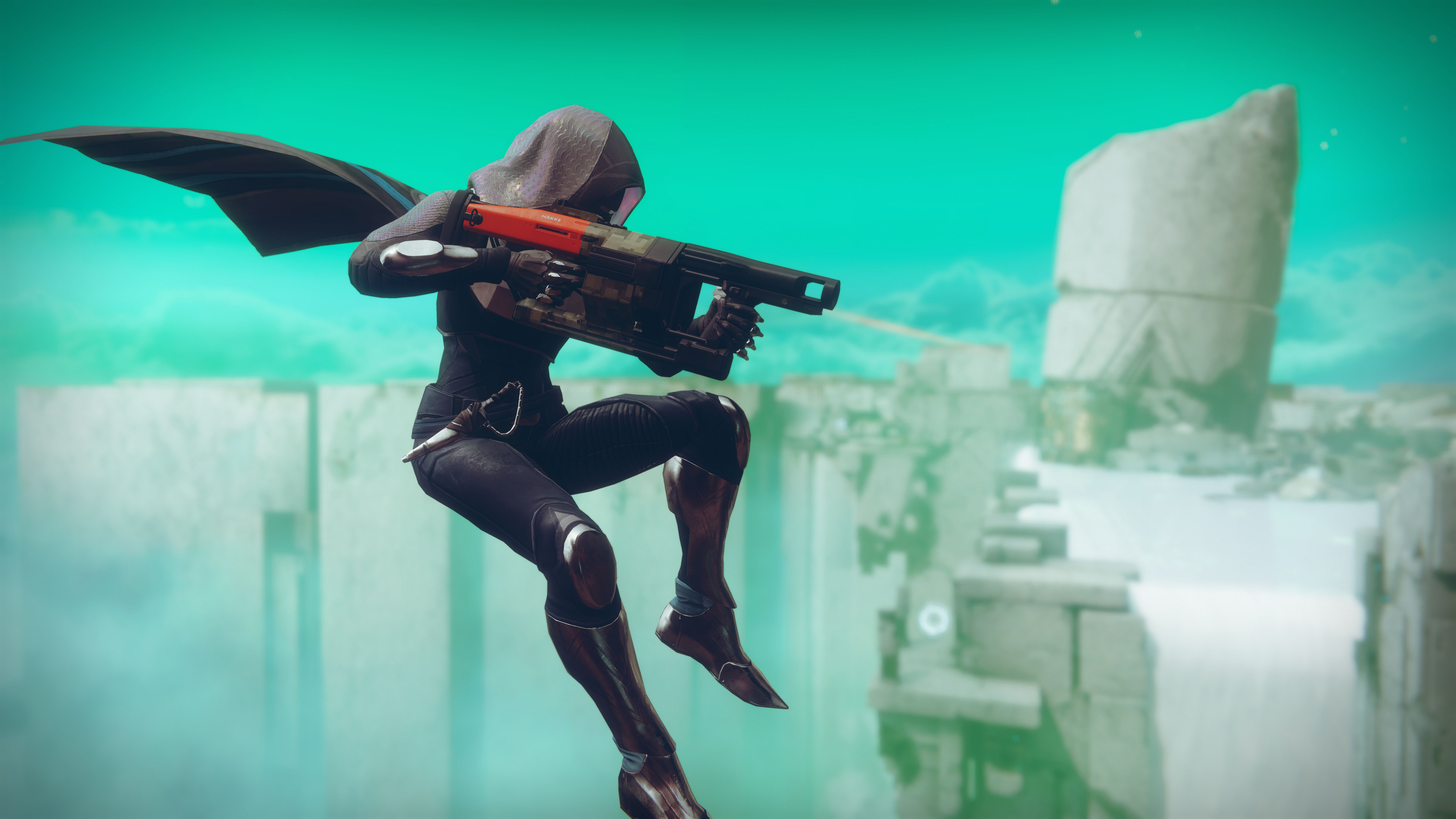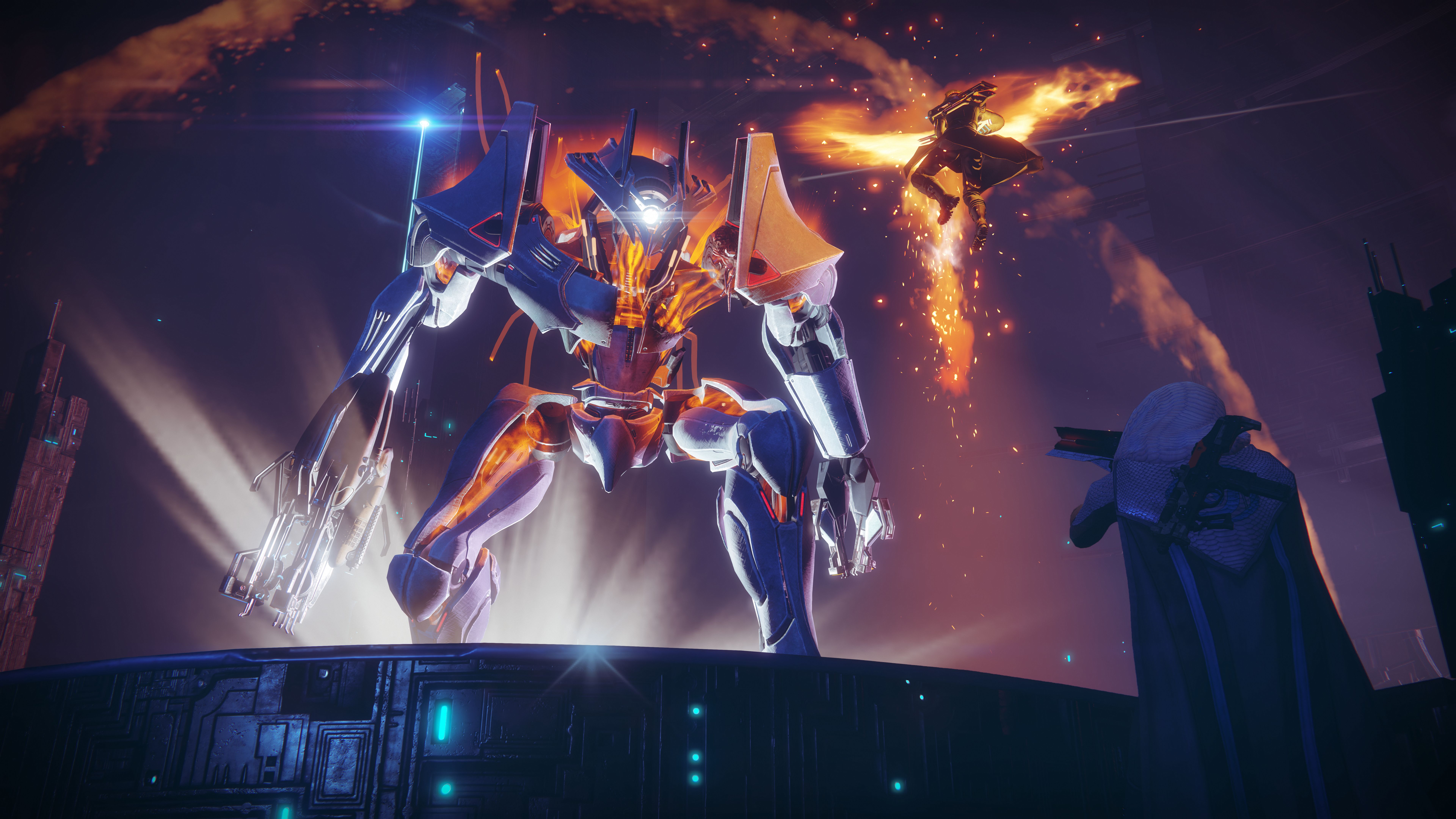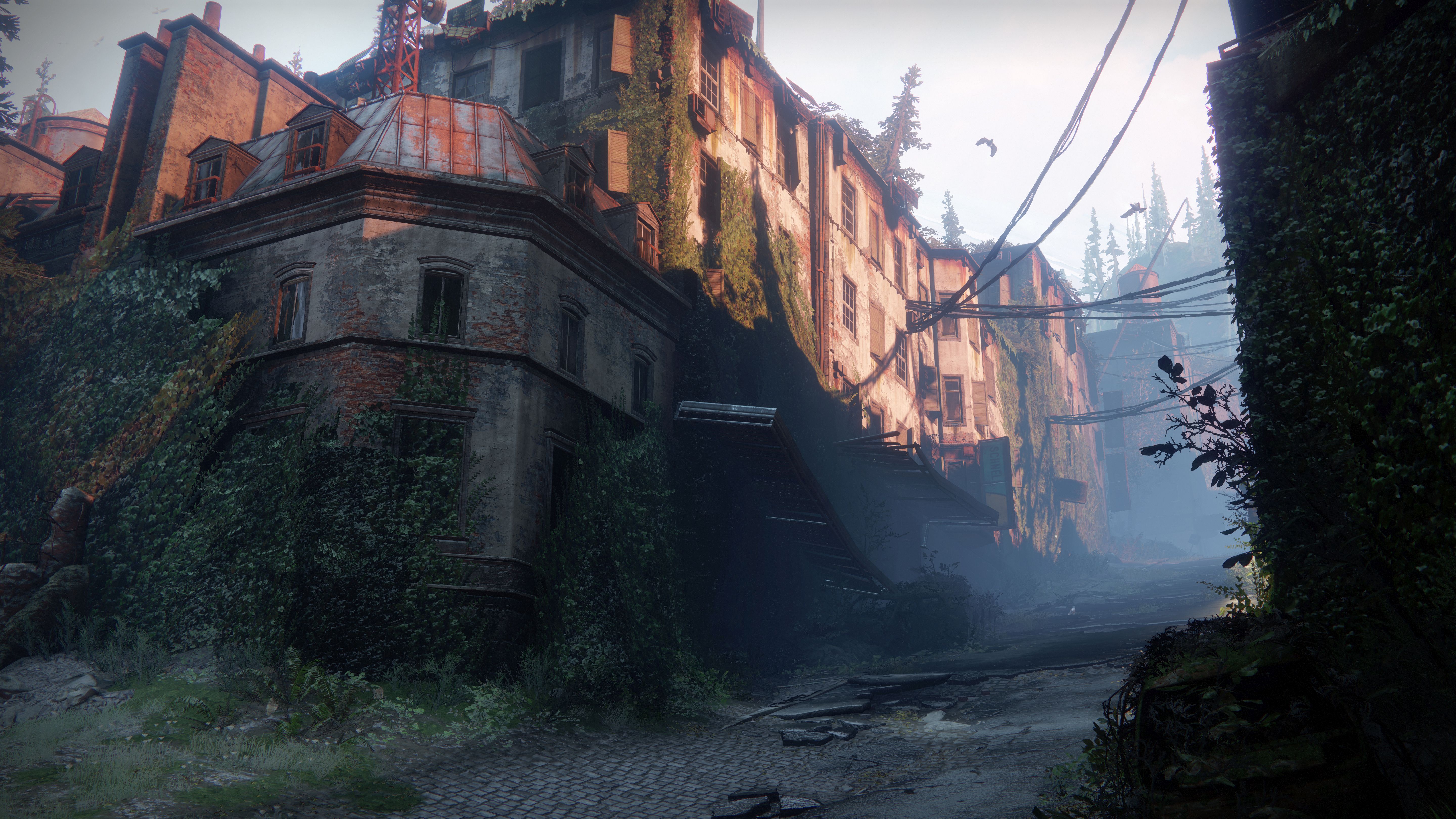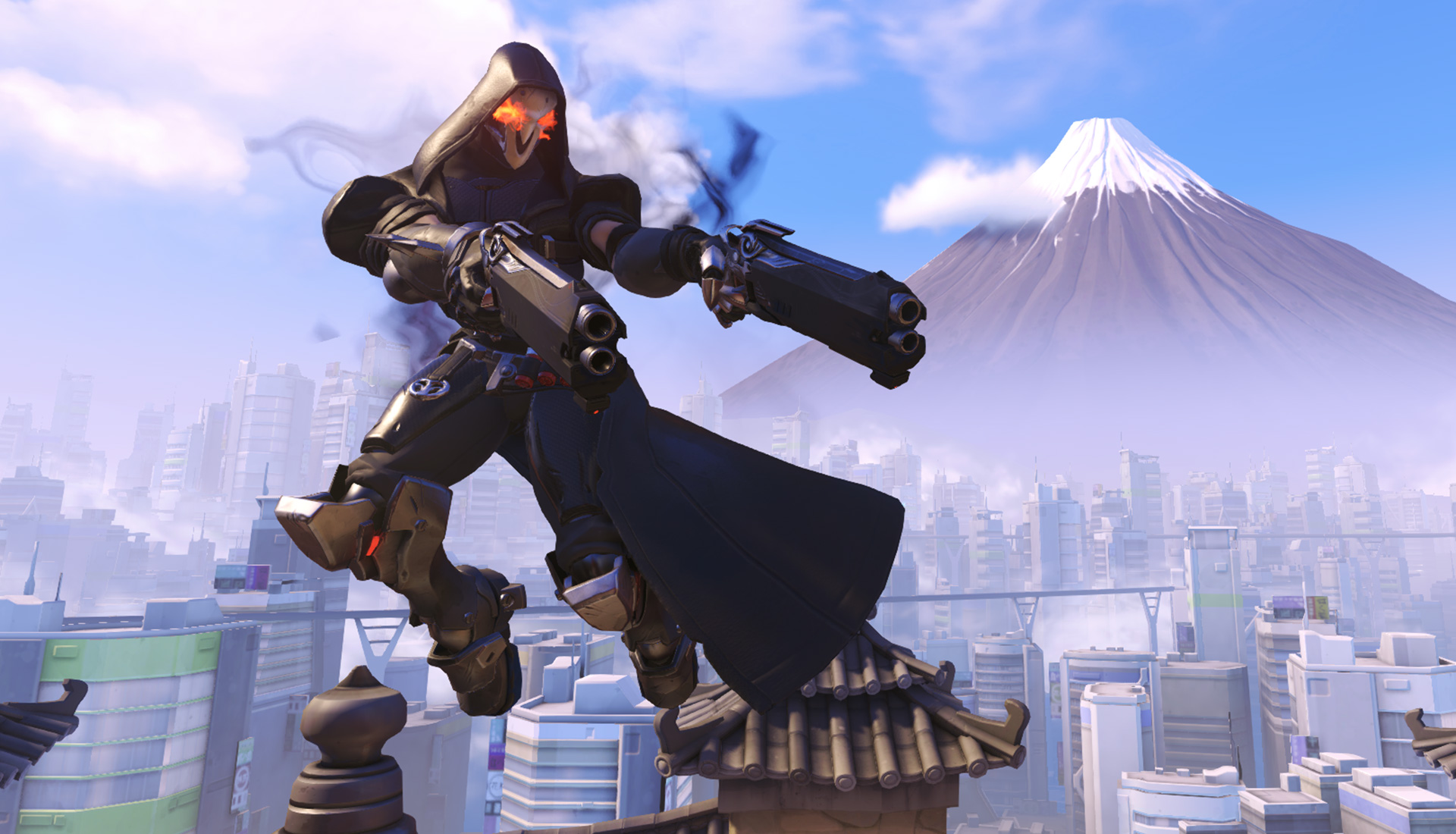
We knew Destiny 2 would release on PC later than on consoles, but it wasn't clear if we were talking weeks or months. Now we know: Destiny 2 will be out on PC on October 24, a little under two months after the console release.
We spent some time with Luke Smith on the show floor at the Destiny 2 reveal event in May, but didn’t have time to ask all the questions PC gamers want answered. Luckily, we were able to arrange a much longer, more in-depth discussion a few days after the event. Read on to learn what Smith had to say about Destiny 2’s biggest influences, the game’s post-launch support, its central storyline, weapon and PvP balance, new and updated PvE activities, plus a surprising day at Blizzard.
On this page: Important PC stuff and details on the Adventure activities
On the next page: Changes to PvP, leaving lore behind, Guided Games
This interview has been edited and arranged for length and clarity.
You were a hardcore WoW raider back in the day. I know you can’t talk to me about the raid going forward, but can you talk to me about how your PC background has informed your approach to Destiny?
I think for me, as a hardcore World of Warcraft player and a Scarab Lord of all things, when I set out with the team back in 2012 to create the first raid for Destiny, it was about the translation of feeling. It was about thinking back to the memories that I had raiding places like Blackwing Lair, not the mechanics—something like Chromaggus wouldn’t be very fun in a shooter—but the moment of “oh, we did it!” And then how do you translate that set of feelings into an action shooter like Destiny? That led to a bunch of exploration and, I think ultimately, the birth of raiding in the first-person shooter which, you know, huge credit to the team. It’s one of the things I’ll probably forever be genuinely proud of.

It’s an experience that I love. It’s an experience that, as a player, is one of my favorite things to do in videogames. I play the game just like a player, so I’ve thrown my controller, I’ve had people in my group threaten to push Atheon off the ledge back in the day—and we didn’t. I love these things. To me, the raid translation from an activity previously only experienced with clicks and spells, to bring it to an action game, it was about the translation of feelings and emotion. How do we want players to feel? How do we make them feel that way? A section like the gorgons from Vault of Glass would be pretty shit in an MMO, but it’s pretty amazing in an action game where all you want to do is run, jump and shoot, for just a few minutes to have discipline and communication.
For PC gamers who are looking at this series potentially for the first time, what is the pitch that you would give them for Destiny? What’s the vision you would hit them with?
Keep up to date with the most important stories and the best deals, as picked by the PC Gamer team.
In not playing the first Destiny game from 2014, you haven’t really missed anything.
Luke Smith
In not playing the first Destiny game from 2014, you haven’t really missed anything. We’re setting up the world for you at the opening of Destiny 2. We have a cool world intro that we’re going to work through. We have basically treated Destiny 2 wholescale like a fresh launchpad for players. So for people who’ve never checked this game out for any number of reasons, we wanted Destiny 2 to be a game that you could look at and pick up off the shelf and open up and understand what’s going on and have a great time.
From a fictional perspective, Destiny 2 and Destiny’s world are hopeful places. You have humanity pushed basically back up against the wall, ushered into this last safe city, protected by heroes. And the players of our world are these heroes. I think that’s pretty universal; you don’t need to understand the specifics of what happened in Destiny 1 to appreciate that universal theme of being a hero in this world that needs heroes. It’s a great time for people to jump in and find out, in Destiny 2, what happens with Dominus Ghaul, the Red Legion, but also to take your first steps into the Destiny franchise and see where we’re going.
With the PC version coming after the console version, there’s the risk of other players on other formats spilling all the raid secrets before we have a chance to go in blind. Is that something you’re thinking about?
That is something that is a non-trivial amount of pain to me as a player. But it’s also, in this case, sort of a necessary pain. We want the PC build and the PC version of the game to get all the time it needs to be a thing that we are, as Bungie, excited to ship. And that means taking the time to get it right and, unfortunately, to take the hit on—you lose some of the zeitgeist and that sort of emotional momentum. I will say we will be working tirelessly to unify those two communities as quickly as possible.
I got a strange email from someone purporting to be a deep-throat at Bungie, whose credentials we’ve been unable to verify thus far. And they claimed that the reason for the delay was Sony wanting an exclusivity window on the console version, so that the PC version doesn’t arrive and look miles better and risk sales of the PS4 pro and stuff. Is that something you can debunk?
That’s categorically false. That is not true.
On a more positive note, can you tell me some stuff you can do with Destiny 2 now that you couldn’t do with Destiny due to having to support PS3 and Xbox 360?
It lets us make larger worlds—larger play spaces, more AI, we have more activities running. That whole existence layer technology which we shared a little about at the presentation, and we may have spoken about on the last day, it’s really possible because of shedding the previous gen. The ability to walk up and launch an activity from the world that has more experienced gameplay than something like a patrol.
Adventures, I think, we’ve undersold in a bunch of ways. They’re like mini missions, in many cases, with more interesting mechanics. You’re able to launch those, and when you’re playing an adventure you’ll almost always start in a public bubble—sorry, that’s our terminology. When you start an adventure you’ll almost always begin playing that adventure in public where other players will see you, so maybe you’re like summoning a boss and they can chip in and fight, and after that initial objective you’ll be ferreted off into a location where you’ll just be by yourself to achieve a bunch of the meat of the activity. There’s a rhythm and a cadence to these things that’s pretty cool, and I think that we have not really described them well enough for players to realize what these are.

Are you able to describe one of those now?
I can probably do that. So, a sample adventure. There’s one on EDZ, the European Dead Zone. You discover early in the adventure that there are these Cabal, these psions, who are casting invulnerability shields on another creature. So you have these encounters out in the open in the public zone, in the shared zones of our world, where you have psions who are making characters invulnerable. You kill the psions, the character’s no longer invulnerable, you can kill the character.
This then leads you into a place like a dark forest. In here, you’re going to learn more about these psions, you’re going to face more of these psions, and of course there’s this encounter rhythm where we’re teaching you that “kill the psion” is the key that you unlock to kill the bad guy. Then we play this note for you throughout this adventure, and it culminates with you fighting an [ultra-class enemy] with a giant gun and waves of ads in a big open forest where psions are continuously reinforcing the fight, making them vulnerable, etc. There’s usually one central mechanic in a bunch of these that you repeat to sort of, again, understand mastering. And there are a number of mechanics like this throughout the game.
Do you see them being really replayable?
This is a good example. Originally we saw these as not being replayable. We initially envisioned these as things you would clean off of your map and be done with it, much like [how] you can’t really replay quest lines and you can’t really replay activities in games like Skyrim or whatever. But this is one of our things with being an action game. Being an action game, you want players to be able to continue to kick the content that they love kicking over and over again.
A lot of this came from the team itself. We recently greenlit a replayability feature for the adventure content, and while it won’t be random access like Destiny 1 where you could just replay stuff whenever you want all the time, there will be a way for you to chew through replaying through adventures if that’s how you want to spend your time.
Is it true that prior to Taken King, some Blizzard guys helped out with some consultancy on loot and leveling systems?
I think consultancy is a dramatically overblown term for it. Here’s some of the backstory: Josh Mosquiera, who’s the game director on Diablo 3, and Mark Noseworthy worked together at [Relic Entertainment], so they have been friends for a long time. Because of that friendship, we reached out to them and said, “hey, do you guys want to come up and do this talk,” that we saw them put together for Gamescom a few years ago.
We sort of had a summit, like a Bungie-Blizzard summit where we met with a bunch of their leaders, their teams.
Luke Smith
They came up and did the talk to a broad audience of designers here at the company. It was a killer talk about, you know, transforming Diablo 3 for Reaper of Souls. It was awesome, a great talk. And then they hung out with us the day afterward, basically just a super small group of folks. Myself—mostly myself, really, and Mark a little bit, but it was me and a couple of their systems designers and Josh just talking all day about philosophy, how they think about games, how we think about games. It was more like knowledge sharing.
I mean, there have been—I don’t know if we’ve talked about this yet. We took a trip down there in December of 2015, a group of senior creative leaders here—Jason Jones and myself, a number of other folks—went down to Blizzard for a day. We sort of had a summit, like a Bungie-Blizzard summit where we met with a bunch of their leaders, their teams. We went around and we were talking to the Hearthstone team and [director Jeff Kaplan] from Overwatch, and it was awesome. But it wasn’t like consultancy, you know, it was just game developers getting together and hanging out—like a little private [Game Developers Conference] where no one’s presenting and everyone’s just sitting around tables sharing their experiences. And it was amazing.
I think our audience would love to hear that! I think it’s interesting to us to think of these kinds of minds, who are working on these games that we love, just interacting. I’m not trying to find something suspicious; I think it’s cool to hear that.
Oh no, oh my gosh, I don’t think you’re trying to find anything suspicious at all. We went down there and it was a blast. I mean, I’m an old, old World of Warcraft head. You know, I’ve done a lot on that game, it’s one of my proudest gaming moments—Scarab Lord from World of Warcraft. So we went to lunch—it was Jones and I, Jeff Kaplan, Tom Chilton, Josh Mosquiera, you know, a bunch of their game directors—and Jeff Kaplan and I rode in his car together, he drove me to lunch. So I just got to pick his brain about Warcraft, which was awesome. Jeff was one of the first people to send me congratulations mail. And we also have been talking to Jeff and the Overwatch team, you know, he volunteered to talk to us about the PC and learning from Overwatch on PC settings and functionality. We’ve been having those conversations with them.
We recognize that Blizzard is a leader in the PC space, and we are taking sort of our first steps out into this space, and what better guides to have in that space than Blizzard’s expertise knowledge? And now we’ve got the awesome Battle.net partnership so we’re going to be there in their launcher alongside a bunch of games that we all really respect and admire. For me, as a fan of Blizzard games, I got to enjoy a lot of this. And then as a developer here at Bungie, the knowledge sharing has been awesome.

Do you think the PC audience will approach the game differently? Do you expect to discover and learn different things from the way they play it?
Yeah, I do expect to. I completely expect to learn different things from the way they’re playing the game. They’re going to have, just by the nature of the input, a different way of playing the game on [keyboard and mouse]. They’re going to have different weapon preferences; I expect to see things like the optimal weapons being different on the two platforms just because of the precision that the keyboard and mouse is providing versus the tactile, controller-in-hand feedback experience on a console.
I played some of the PC build at the reveal event using a scout rifle—and I’m a scout rifle guy anyway—and it seemed like scout rifles had almost been heavily buffed just because I was using a mouse. Assuming you’re going to balance unilaterally, do you think that will pose any issues for balancing the game across platforms?
I wouldn’t be so quick to make the assumption that we’re going to balance unilaterally. I think that we want to have one design build of Destiny, and the one design build means that we have exotic A and exotic A, and they’re both the same exotic across the builds for the game. But with the specific tunings and the way the guns play in each ecosystem, those are two consumer types with very different needs.
We are treating recoil in a custom way, we’re treating aiming and bullet accuracy custom for the PC.
Luke Smith
On a controller where you have rumble and rich tactile feedback, you want the controller response to feel like the weapon response—recoil, etc. When you’re playing with mouse and keyboard you don’t want to constantly be playing with this game of like dragging your mouse back down to counter recoil. So our team, working with our partnership at [Vicarious Visions], has been working tirelessly on the PC control scheme because we really take a lot of pride here at Bungie in our games playing extremely well.
Going here into PC for the first time, we want to make sure that the PC game plays as well as the console game with respect to the audience’s desires. So that means custom: we are treating recoil in a custom way, we’re treating aiming and bullet accuracy custom for the PC. We want to have a game that plays amazingly on the PC for what the PC audience expects.
With the PC version coming out a bit after the console version, will there be any way for people to migrate to PC? To bring their account over or anything like that?
No, there’s no plans to do that currently. That is not something players should expect to have for Destiny 2 launch. Sorry, I just don’t want to say that in a way that leaves hope.
On the next page, Smith details changes to PvP, how the Guided Games system will work, whether Destiny 2 will have swappable loadouts, and more.
With over two decades covering videogames, Tim has been there from the beginning. In his case, that meant playing Elite in 'co-op' on a BBC Micro (one player uses the movement keys, the other shoots) until his parents finally caved and bought an Amstrad CPC 6128. These days, when not steering the good ship PC Gamer, Tim spends his time complaining that all Priest mains in Hearthstone are degenerates and raiding in Destiny 2. He's almost certainly doing one of these right now.


